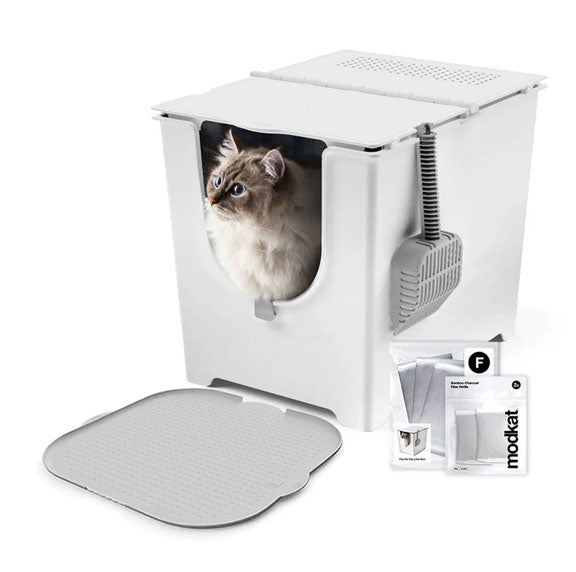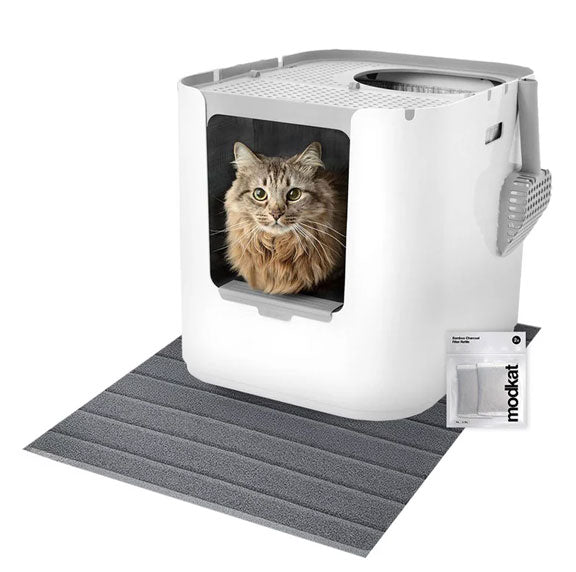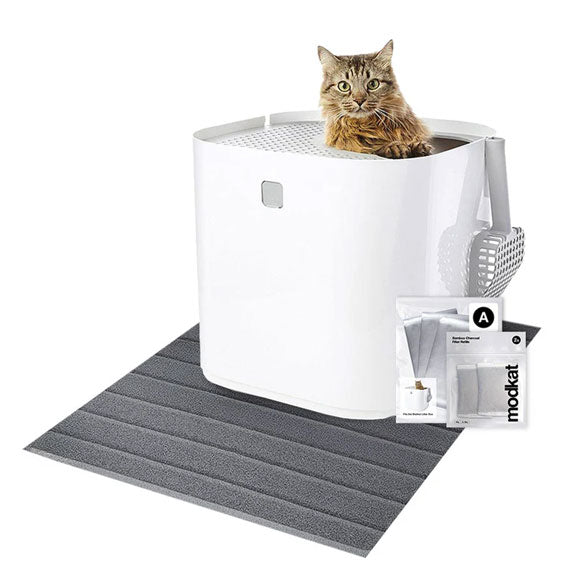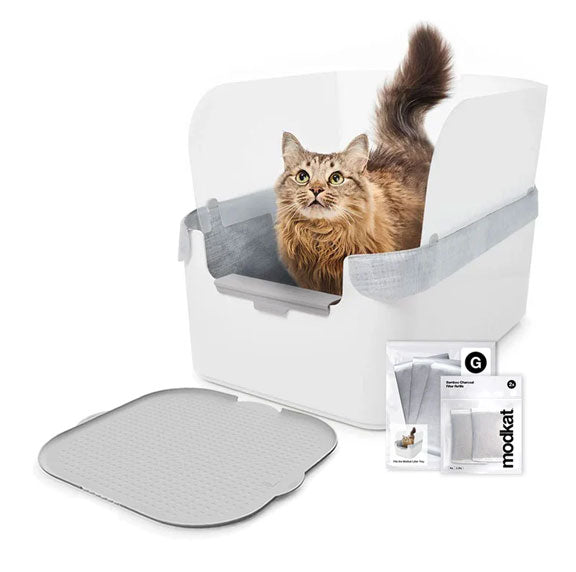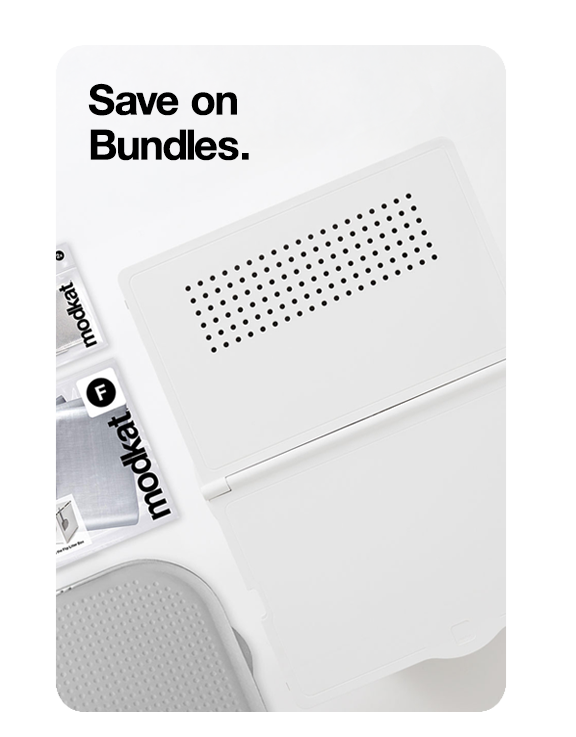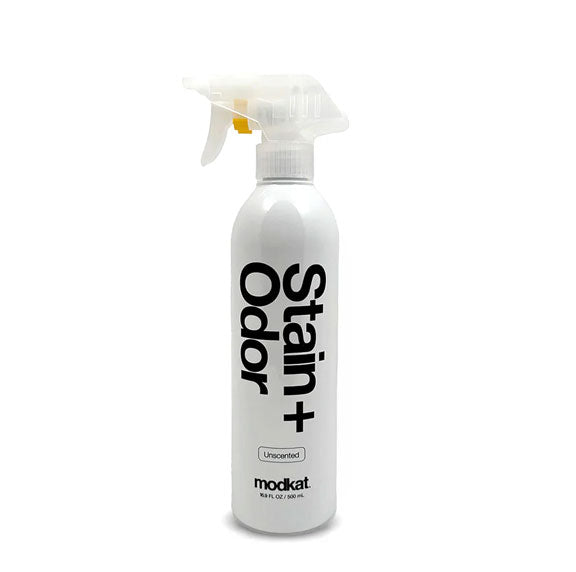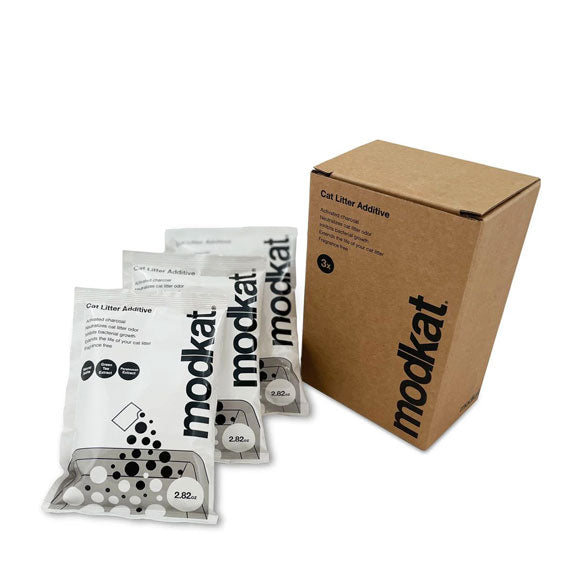Litter Boxes
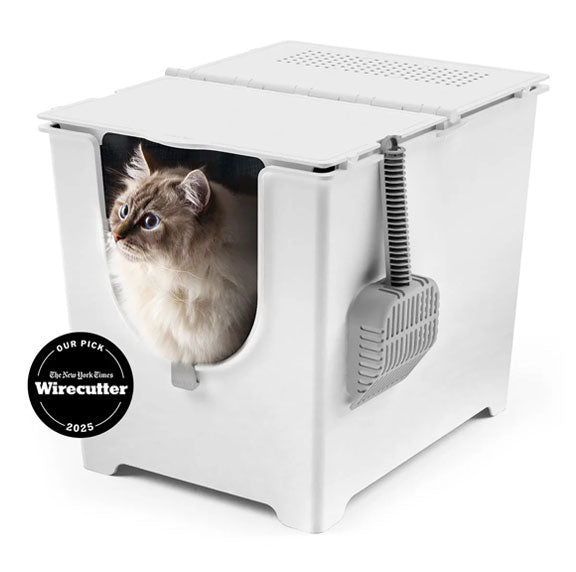
Modkat Flip
Front-Entry Litter Box
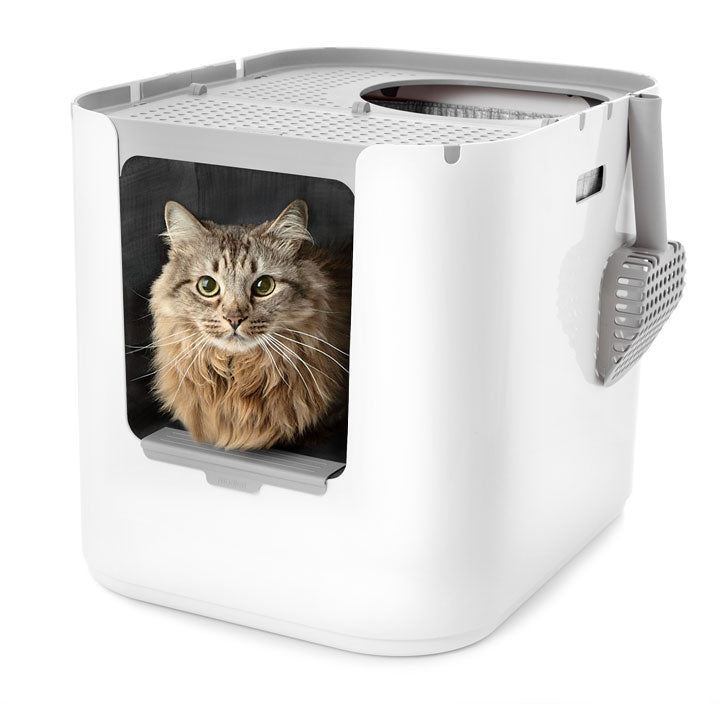
Modkat XL
Front/Top-Entry Litter Box
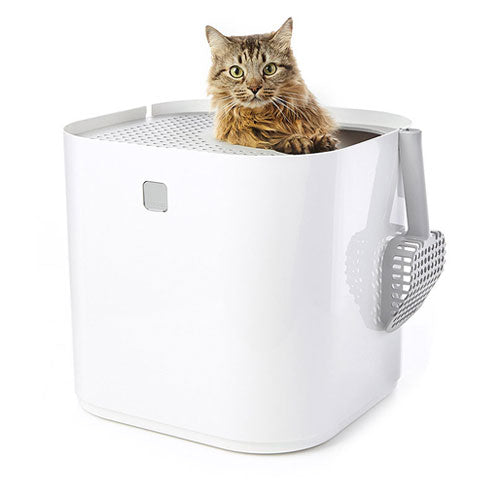
Modkat
Top-Entry Litter Box
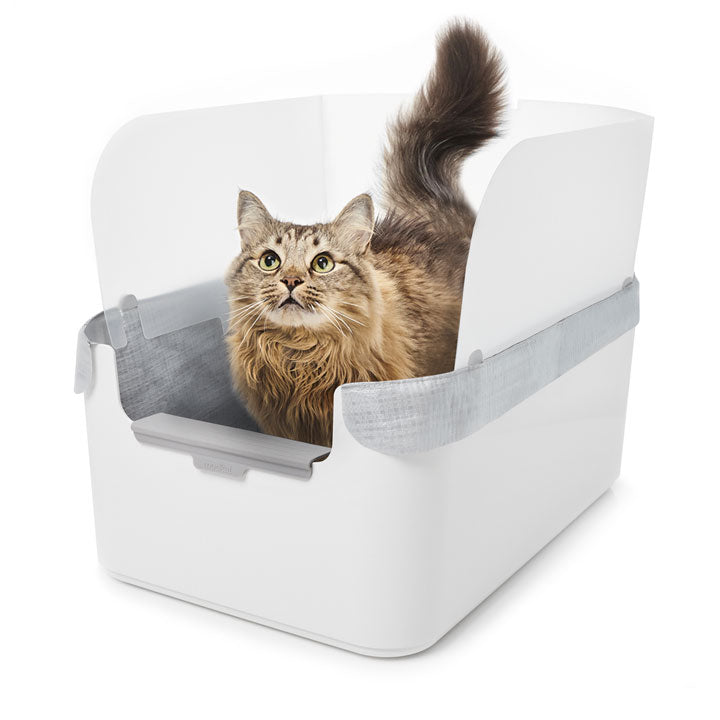
Modkat Tray
Open Litter Box
Starter Kits
Essentials
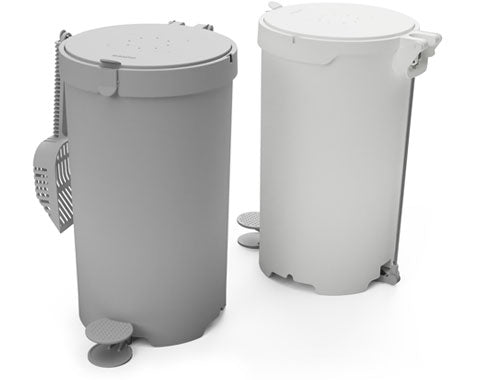
Litter Keeper
Two colors
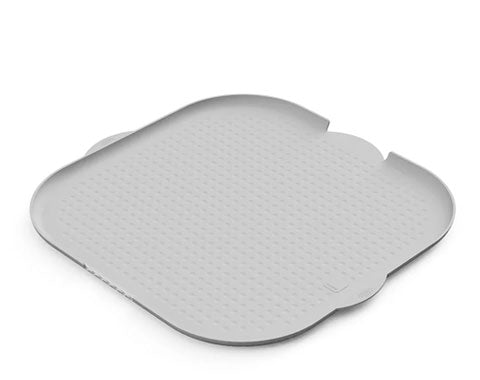
Litter Mats
Multiple styles, colors & sizes
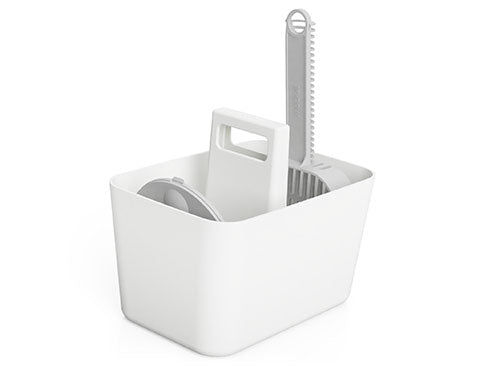
Tidy-Up Kit
Scoop holder & dustpan

Lounge + Play
Scratchers & toys
Refills
Add description, images, menus and links to your mega menu
A column with no settings can be used as a spacer
Link to your collections, sales and even external links
Add up to five columns
Add description, images, menus and links to your mega menu
A column with no settings can be used as a spacer
Link to your collections, sales and even external links
Add up to five columns
7 Reasons why your cat is accidentally peeing in the house.
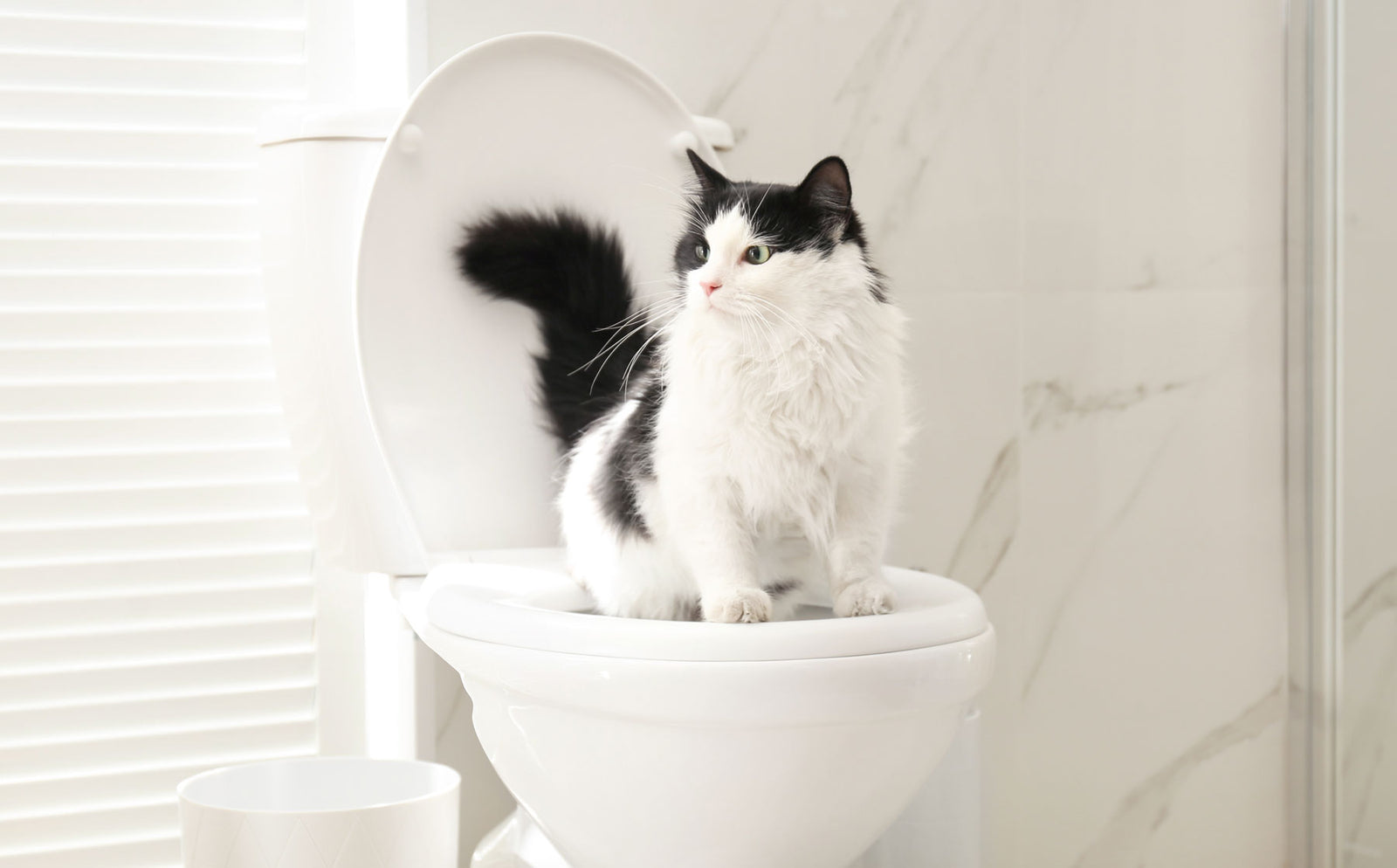
Life with your cat was going great until one day you discovered cat feces or a puddle of urine in a spot not approved for use by your four-legged companion.
Now you’re not only annoyed but you’re frustrated too! However, your cat is not deliberately causing trouble. There's a reason he has forsaken his litter box to eliminate in inappropriate places in your house. This behavior is not all that uncommon in house cats, and unfortunately, it becomes the main reason some cat parents throw in the towel on their kitties. But it also is an issue that can be addressed and corrected once you determine what’s causing your cat to accidentally pee outside their litter box.
Let’s explore some possible reasons why your cat is accidentally peeing where they’re not supposed to and how you can correct this unwanted behavior.
Common causes behind inappropriate elimination.
Cats aren't usually being "bad" by peeing in a bathtub or another inappropriate place. Usually, they do business in the wrong place because they're sick, are marking their territory, feel stressed, or the box hasn't been cleaned.
Do all cats have accidents? No, but many do.
Some cat breeds are predisposed to certain medical conditions that increase the likelihood of inappropriate elimination behavior. For example, Persian and Siamese cats are more prone to urinary tract issues than other cat breeds.
Older cats may also have more accidents because they are more likely to have a feline UTI, dementia, or loss of muscle control. Cats who have experienced trauma or abuse in the past may "misbehave" due to anxiety or fear.
Understanding the common causes behind inappropriate elimination can help you address the issue and find a solution. Let's dive deeper into each specific cause and look at how to correct and prevent accidents.
7 reasons why your cat is accidentally peeing.
1 - Medical issues.
Cats get diseases like hypothyroidism, diabetes, arthritis, kidney disease, bladder stones, and UTIs, which can all cause inappropriate elimination. If your cat is drinking a lot of water or if her urine smells strongly of ammonia, your pet may need a visit to the vet. They can help diagnose and treat any underlying conditions that may be contributing to the problem.
2 - Marking territory.
Cats mark their territory for two primary reasons — to claim ownership or to signal sexual availability. To claim their space, cats rub up against objects, leaving a little something from the scent glands on their paws, butts, or cheeks.
Spraying urine is another way cats mark their territory. This behavior is more common in unneutered males but can also be seen in females. Having your pet spayed or neutered, playing with the animal regularly, and keeping the choicest spraying spots squeaky clean can all help eliminate this behavior.
3 - Stressed out.
Just like humans, cats can feel bored, fearful, or stressed. Changes in their environment, such as moving to a new home or a new pet joining the household, can cause cats to feel anxious and unsettled. Many pets cope with these feelings in a variety of unhealthy ways, including litter box avoidance.
If you suspect that your cat's inappropriate elimination is due to stress, try to create a calm and secure environment for them. Providing them with plenty of hiding spots, vertical space, and quiet areas can help alleviate their stress and encourage proper litter box use.
4 - Aversion to litter box location.
Some cats may not like where you put their litter box — proper litter box placement is just that important to them. If the box is in a noisy or high-traffic area, they may feel uncomfortable using it and prefer to find alternative spots in the house. Help your kitty out by relocating the litter box to a quieter and more secluded area where your cat feels safe and secure.
5 - Dirty litter box.
Cats are famously clean animals and prefer a pristine place to eliminate. If their litter box is dirty or filled with clumps, they may seek out a cleaner spot to do their business. Regularly scooping the litter box and washing the box at least once a week can help your box remain tempting to a finicky feline.
6 - Aversion to the litter itself.
Some cats may have an aversion to the type of litter you're using in their litter box. Certain textures or scents may turn them off, causing them to seek out alternative places to eliminate. Experiment with different types of litter until you find one that your incontinent cat prefers.
7 - Dislikes the litter box.
Does your cat seem to have a strong aversion to their litter box? It's not uncommon for cats to dislike certain aspects of their litter box, such as the height of the sides or the narrow entrance. If you suspect the box is too small — a box should be 1 ½ times as long as a cat from nose nub to tail tip — try an XL litter box. If the entrance is hard to access, consider a box that has an open front.
Whatever the reason for your cat's elimination issues, one of the most important things you can do is clean the cat’s litter box until the smell of urine is completely eradicated.
How to clean cat urine.
Dealing with cat urine can be a real headache, especially when it leaves behind a strong and lingering odor. So, how do you clean up cat urine and get rid of the smell?
- Act quickly. The longer the urine sits, the harder it will be to remove the odor. Start by blotting up as much of the wetness as possible using paper towels or a clean cloth. Avoid rubbing, which can spread the urine and make the problem worse.
- Use an enzymatic cleaner. Ordinary household cleaners won't do the trick, as they may not completely eliminate the scent. Instead, opt for an enzymatic cleaner specifically designed to get rid of that unique cat pee smell. These cleaners contain enzymes that break down the uric acid crystals, which are responsible for the lingering odor.
-
Follow the instructions on the cleaner carefully. Make sure to saturate the affected area and allow it to air dry. Depending on the severity of the urine odor, you may need to repeat the cleaning process a few times.
By using the right products and techniques, you can effectively clean cat urine and eliminate the smell, helping to prevent future accidents.
5 tips for finding the best litter box to prevent accidents
When it comes to preventing accidents and ensuring your cat uses the litter box consistently, finding the right litter box is essential. Here are some tips to help you choose the best litter box for your cat:
- Tip 1. Consider the size: Make sure the litter box is big enough for your cat to comfortably move around and dig in. Cats prefer larger spaces, especially if they have urinary incontinence or bowel incontinence.
- Tip 2. Choose the right type: Some cats prefer covered litter boxes for privacy, while others prefer open-top solutions. Your cat's behaviors should give you real insight into what style he prefers — covered or uncovered.
- Tip 3. Opt for low sides: Cats with mobility issues, such as arthritis, may have trouble climbing into high-sided litter boxes. Look for litter boxes with low sides or ramps to make it easier for them to access. You may even look for a litter tray.
- Tip 4. Provide multiple litter boxes: If you have a multi-cat household or a cat who frequently gets bouts of diarrhea, it's important to have multiple litter boxes available. This prevents competition for resources and gives each cat a designated space to take a leak.
- Tip 5. Consider litter box accessories: Some litter box accessories, such as litter box liners or mats, can help make cleaning easier and prevent litter scatter.
Every cat is unique, and what works for one cat might not work for another. It may take some trial and error to find the perfect litter box that meets your cat's needs. Don't be afraid to try different options and observe your cat's behavior to ensure they are comfortable and using the litter box consistently.
Shop the Modkat litter boxes and accessories to freshen up your cat litter area today!
“It looks nicer than any other hooded or open option we considered.”

Categories
Meow from Brooklyn.
Sign up and get early access to product drops, exclusive offers, and the occasional cat meme.
Similar products related to this blog:
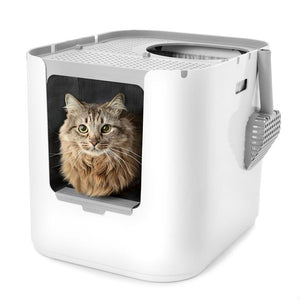
"It looks nicer than any other hooded or open option we considered."

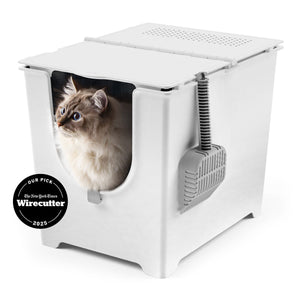
"This litter box keeps everything in, nothing gets out the sides."
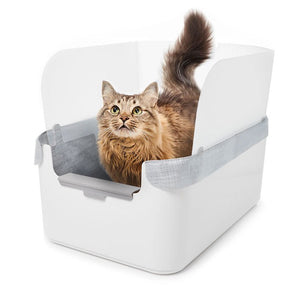
"My beautiful ragdoll cat and I both love the new Modkat Litter tray!"

